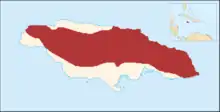Ring-tailed pigeon
The ring-tailed pigeon (Patagioenas caribaea) is a species of bird in the family Columbidae. It is endemic to Jamaica.[2]
| Ring-tailed pigeon | |
|---|---|
.jpg.webp) | |
| Scientific classification | |
| Domain: | Eukaryota |
| Kingdom: | Animalia |
| Phylum: | Chordata |
| Clade: | Dinosauria |
| Class: | Aves |
| Order: | Columbiformes |
| Family: | Columbidae |
| Genus: | Patagioenas |
| Species: | P. caribaea |
| Binomial name | |
| Patagioenas caribaea (Jacquin, 1784) | |
 | |
| Distribution of the ring-tailed pigeon | |
| Synonyms | |
|
Columba caribaea Jacquin, 1784 | |
Taxonomy and systematics
The ring-tailed pigeon is monotypic.[2] Along with the Chilean pigeon (P. araycana) and band-tailed pigeon (P. fasciata), it may form a superspecies.[3]
Description
The male ring-tailed pigeon is 38 to 48.5 cm (15.0 to 19.1 in) long and the female 38 to 43 cm (15 to 17 in). One bird whose sex was not reported weighed 250 g (8.8 oz). The adult male's head, neck, and underparts are reddish to pinkish. Its hindneck has a metallic green or bronze patch and the rest of the upperparts are brownish gray. The tail is gray (darker near the body) with a slate band across its middle. The eye is orange surrounded by bare red skin. The adult female is similar to the male but with an olive or brown cast to the wings, redder underparts, and a less metallic hindneck. The juvenile is mostly grayish with a brown cast and a fawn to cinnamon belly.[4]
Distribution and habitat
The ring-tailed pigeon is found only in Jamaica, and is most common in the John Crow Mountains, the eastern Blue Mountains, and the Cockpit Country. It mostly inhabits wet highland forest, and wet limestone forest in the Cockpit Country. In elevation it ranges as high as 2,000 m (6,600 ft).[4]
Behaviour
Feeding
The ring-tailed pigeon feeds only on fruit, often taken while climbing or hanging upside-down in trees.[4]
Breeding
The ring-tailed pigeon breeds in spring and summer. The nest is a thick platform made of twigs and lined with leaves and bark. It is placed high in a tree and hidden in climbing vegetation.[4]
Vocalisation
The ring-tailed pigeon's advertising call is "a series of 4–5 cooing notes" rendered as "cooOOh...cooOOh...cooOOh...".[4]
Status
The IUCN initially assessed the ring-tailed pigeon as Critically Endangered but since 2000 has rated it Vulnerable "because anecdotal evidence and the many threats it faces indicate that the range and population must now be small and declining."[1] "Both hunting and forest destruction remain rampant, and pose very serious threats".[4]
References
- BirdLife International (2020). "Ring-tailed Pigeon Patagioenas caribaea". IUCN Red List of Threatened Species. 2020. Retrieved 14 September 2021.
- Gill, F.; Donsker, D.; Rasmussen, P. (July 2021). "IOC World Bird List (v 11.2)". Retrieved July 14, 2021.
- Remsen, J. V., Jr., J. I. Areta, E. Bonaccorso, S. Claramunt, A. Jaramillo, D. F. Lane, J. F. Pacheco, M. B. Robbins, F. G. Stiles, and K. J. Zimmer. Version 24 August 2021. A classification of the bird species of South America. American Ornithological Society. https://www.museum.lsu.edu/~Remsen/SACCBaseline.htm retrieved August 24, 2021
- Baptista, L. F., P. W. Trail, H. M. Horblit, P. F. D. Boesman, and E. F. J. Garcia (2020). Ring-tailed Pigeon (Patagioenas caribaea), version 1.0. In Birds of the World (J. del Hoyo, A. Elliott, J. Sargatal, D. A. Christie, and E. de Juana, Editors). Cornell Lab of Ornithology, Ithaca, NY, USA. https://doi.org/10.2173/bow.ritpig.01 retrieved September 14, 2021
